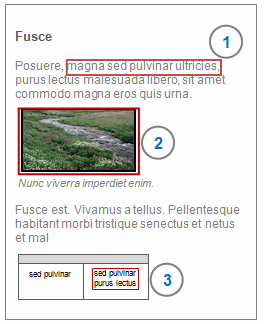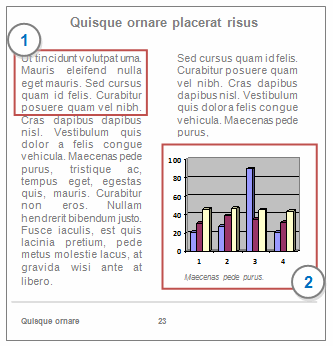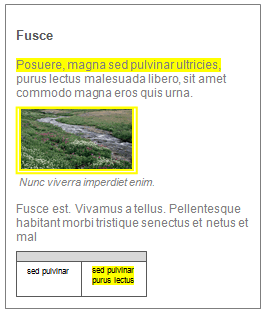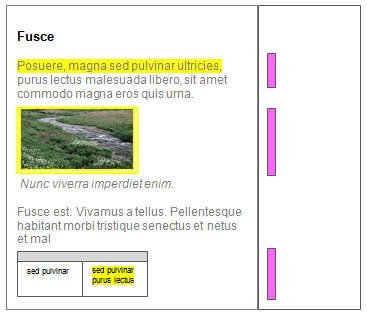Basic coding in documents, PDFs, externals and memos
This topic will get you started with coding documents and PDFs—refer to Coding techniques for more information about coding.
What do you want to do?
- Understand what you can code in documents
- Understand what you can code in PDFs
- Understand what you can code in externals and memos
- Code at a node
- See what you have coded
- Open a node to see the references
Understand what you can code in documents
In document sources you can select and code text or images:

1 Select and code portions of text—a few words, a whole passage or all text in the source. Click and drag to select the text you want to code. You can also double-click to select a word and triple-click to select a paragraph.
2 Select and code entire images.
3 Select and code text or images in tables
NOTE If you have a collection of structured documents, you can use automatic coding techniques to speed up coding. For example, if you are working with a collection of interview transcripts, you can automatically code the contents based on heading styles or paragraph number—refer to Automatic coding in document sources for more information.
Understand what you can code in PDFs
You can select and code text or regions of the page:

1 Select and code portions of text. By default, PDFs open in text selection mode—you can click and drag to select the text you want to code. You can also double-click to select a word and triple-click to select a line.
2 Select and code regions of a page. If you switch to region selection, you can click on an image to select it, or click and drag to select a rectangular region of the page. When you code a region, you are coding an image selection—if the region contains text, you are coding an image of text (rather than text).
To switch between text and region selection—on the Home tab, in the Editing group, under PDF Selection, click Text or Region.
NOTE
-
PDFs that are created by scanning paper documents may contain only images—each page is a single image. if you import the PDF into NVivo, you will find that there is no text in the page to select and code. You can select and code regions of the page, however you are coding an image selection and you cannot use Text Search or Word Frequency queries to explore the text. If you prefer to work with text (rather than images of text), then you should consider using optical character recognition (OCR) to convert the scanned images to text (before you import the PDF files into NVivo).
-
NVivo tries to determine the order of text on a PDF page, however when you select text, you may find that the text on the page is not sequenced as you expect.
Understand what you can code in externals and memos
In externals and memos (just like in documents), you can select and code text and images—refer to Understand what you can code in documents for more information,
Code at a node
-
Select the content you want to code.
-
On the Analyze tab, in the Coding group, click Code.

The Select Code Items dialog box is displayed.
-
Select one or more existing node or click New Node to create and code to a new node—refer to Select Code Items for information about using this dialog box.
-
Click OK. A confirmation message displays briefly in the status bar to indicate that coding is successful.
NOTE
-
You can also drag and drop content on existing nodes or use the right-click shortcut menu to code. Refer to Coding techniques for more detailed information about coding.
See what you have coded
To see what has been coded in a source, you can
-
Turn on coding highlight—on the View tab in the Coding group, click Highlight, and then select a highlight option. Coded content is highlighted in yellow:

-
Turn on coding stripes—on the View tab in the Coding group, click Coding Stripes, and then select an option. Coding stripes are displayed on the right of the source:

For more information, refer to Highlight coding references and Use coding stripes to explore coding.
Open a node to see the references
You can open a node to see all the coded references:
-
In Navigation View, locate and click the folder that contains the node you want inspect.
-
In List View, double-click the node. The node opens in Detail View.
-
On the right of the node, click the Text tab or PDF tab.
The Text tab shows content coded in documents, externals and memos. The PDF tab shows content coded in PDF sources.


 Top
of Page
Top
of Page